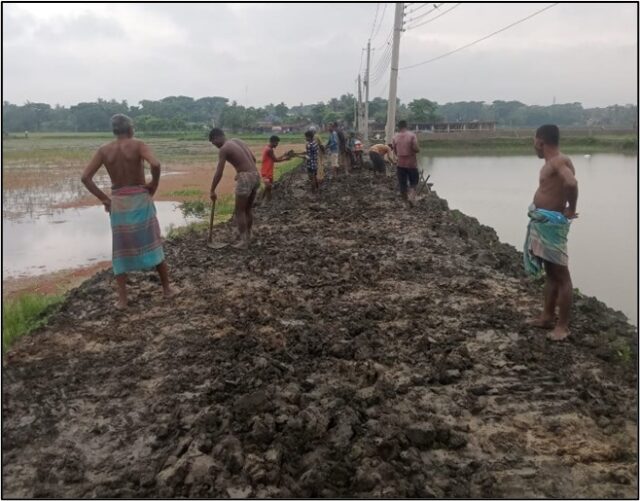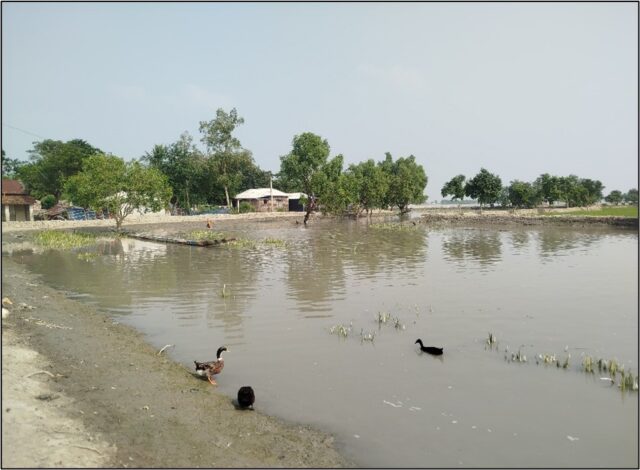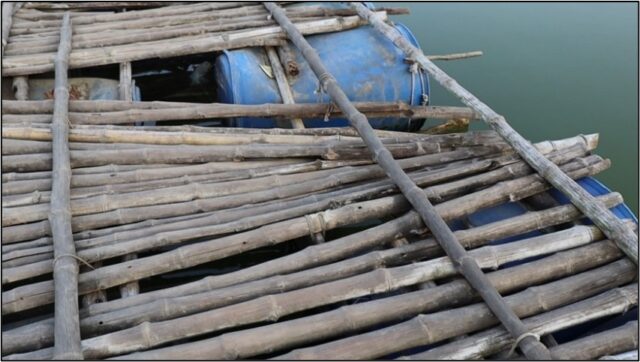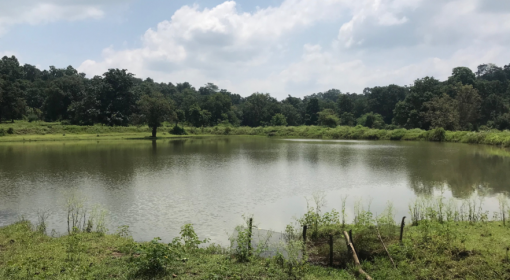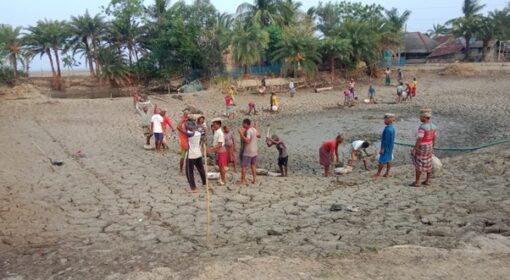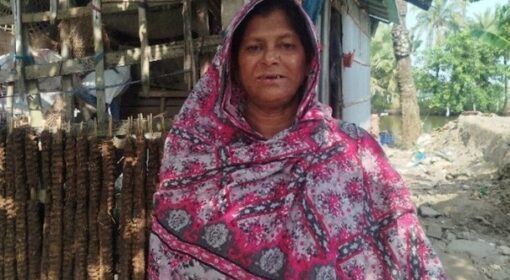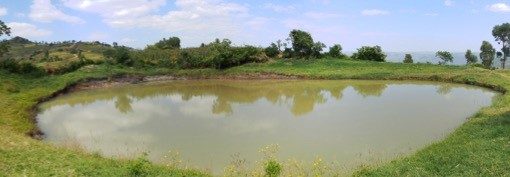By Md. Mehedi Hasan Shuvo, Monitoring & Evaluation Officer, Climate Change & Water Governance Program, Uttaran
These personal stories are part of a dossier on locally-led adaptation, featuring insights and lessons from the Reversing the Flow (RtF) program. RtF empowers communities in Bangladesh, Burkina Faso, Ethiopia, Kenya, and Sudan to build climate resilience through direct funding and a community-driven, landscape approach.
Name: Zaynab Khatun
Location: Godaibill Village (Godaibill Landscape), Ward-01, Satkhira Municipality
Family: Lives with husband and son
Zaynab Khatun lives with her husband and son in Godaibill, a settlement in Ward-01 of Satkhira Municipality. Unlike typical villages, Godaibill was once a low-lying area, known locally as a bil, which gradually became a refuge for climate-displaced families from the Sundarbans coastal region. Over time, people began to settle here after losing their homes to rising sea levels, frequent cyclones, and river erosion. The village, however, remained extremely vulnerable. It had only one access road, which would stay submerged under waist-deep water for nearly seven months each year. Most residents in the area live below the poverty line, earning their livelihoods through domestic work, rickshaw pulling, daily labor, waste collection, or, in some cases, begging.
| 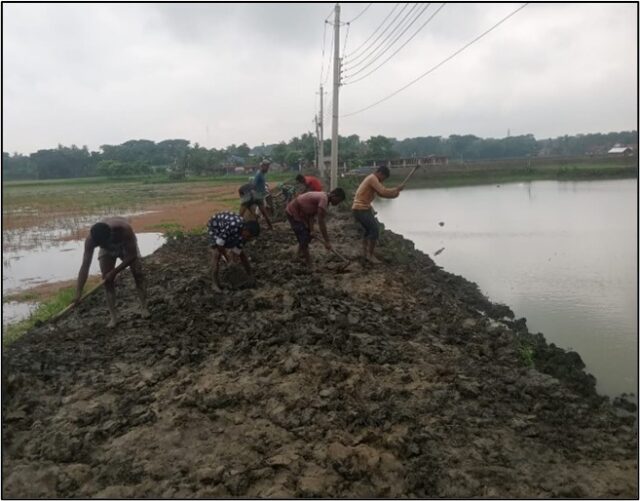 |
“When the road was flooded, no one could go outside to work or earn a living,” Zaynab explained. “People suffered immensely. Many met with accidents while trying to cross the water just to survive.”
For years, the residents of Godaibill reached out to municipal authorities, the Upazila Nirbahi Officer (UNO), and various NGOs to seek support for road repair, but their appeals went unanswered. Finally, with guidance from the NGO Uttaran, the community came together to form a grassroots association. Through this platform, they developed a plan and, with financial support from the LANDWATER Project, decided to repair the road themselves. In municipal areas, government budget allocations for road maintenance typically cover only the repair or reconstruction of concrete surfaces, with no provision for essential preparatory work such as soil layer filling. This gap in funding posed a significant challenge for the community, as they lacked the financial and technical capacity to undertake the necessary groundwork on their own. As a result, the absence of a properly prepared soil base led to delays in the commencement of road construction, highlighting a critical disconnect between infrastructure planning and the practical needs of low-resource communities. With strong community participation and collective labor, the road was rebuilt, transforming daily life in the village
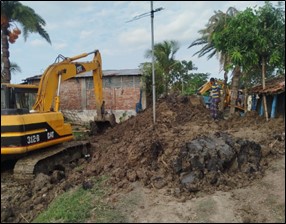 | 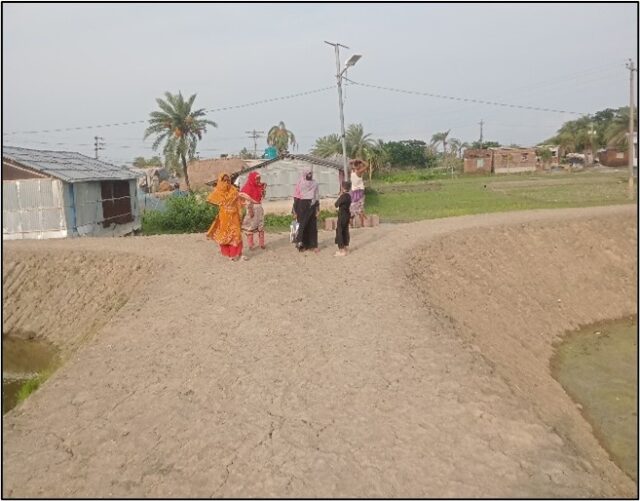 |
Name: Reshma Begum
Location: Boyarjhapa Adarsha Village (Soladana Landscape), Bangladesh
Family Status: Divorced, lives with her mother
Reshma Begum lives with her mother in Boyarjhapa Adarsha Village (Soladana Landscape), a community of 111 landless families who were resettled here with government permission. The village is located outside the main embankment, leaving it highly vulnerable to tidal surges and natural disasters. Surrounded by a fragile earthen embankment and situated in a saline-prone zone, the community struggles with water salinity both from the river and underground sources.
In this area, people rely almost entirely on harvested rainwater for drinking, cooking, and household chores. For years, one freshwater pond served as the community’s lifeline. However, during the recent Cyclone Remal, the embankment was breached, and saline river water flooded the pond, rendering it unusable. Since then, the villagers have been facing a severe water crisis. Without a local source of safe drinking water, residents are forced to walk long distances to collect fresh water, often spending a significant part of their day doing so. The burden falls disproportionately on women, who face serious disruptions in daily life and increased health risks from using saline water for cooking, bathing, and washing.
“Women in our village have been suffering from various health problems because of the salty water,” Reshma explained. “We had no choice but to use it after the pond was flooded.”
In response to the crisis, the community, with the support of Landscape based Organization under the RtF project came together and decided to restore the damaged freshwater pond. The restoration work is now underway and is expected to be completed before the start of the rainy season. Once completed, the pond will once again serve as a reliable source of freshwater for the entire village.
“This initiative brings hope,” Reshma said with a sense of pride. “Soon, we will no longer need to travel miles for water. Our lives, especially for the women, will become much easier.” Her words reflect more than just relief they signify the growing role of women in community decision-making. The restoration of this pond is not only a solution to the water crisis but also a powerful example of how inclusive, community-led interventions can amplify the voices of those often left unheard. Women like Reshma, once excluded from local governance processes, are now actively participating in shaping the future of their communities. This initiative exemplifies locally led adaptation (LLA) in action, where the most vulnerable particularly women at the grassroots are meaningfully engaged in decisions that directly impact their lives. With the right support and a platform for inclusive participation, even marginalized communities can build resilience and reclaim their right to a dignified, sustainable future.
| 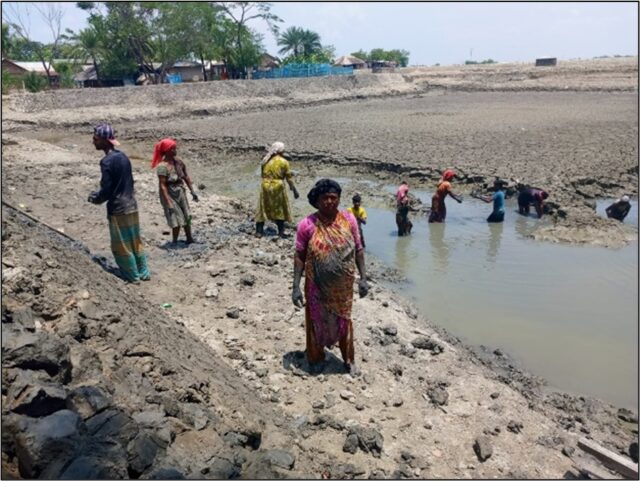 |
Name: Afzal Hossain Dablu
Location: Hajrakhali Village, Sreeula Union, Assasuni Upazila
Family: Lives with wife and two children
Afzal Hossain Dablu lives with his wife and two children in Hajrakhali, a once-thriving agricultural village in Shreeula Union under Assasuni Upazila. In earlier times, the community enjoyed peace and prosperity through farming and fishing. However, recurring natural disasters have drastically altered life in this coastal region.
Over the years, repeated breaches of the embankment have allowed saline river water to flood the land, making agriculture nearly impossible. In 2020, Cyclone Amphan devastated the area, washing away the village’s only access road. In its place, a river channel nearly 40 feet deep and 130 feet wide emerged, effectively turning Hajrakhali into an isolated island.
“Our lives changed overnight,” Afzal shared. “Reaching the mainland became a daily struggle.”
With support from the Union Parishad, the community initially constructed a floating bamboo bridge. But it was unstable and unsafe. Several people were injured while crossing it, including incidents of broken hands and legs. As isolation grew, so did social exclusion. Families from other areas hesitated to arrange marriages with villagers from Hajrakhali. Things began to change when the LANDWATER Project funded by the RtF program and Facilitated by Uttaran, extended support to construct a durable and safe bridge. With funding and technical guidance from Uttaran, the community built a strong wooden bridge that now connects Hajrakhali to the surrounding region.
| 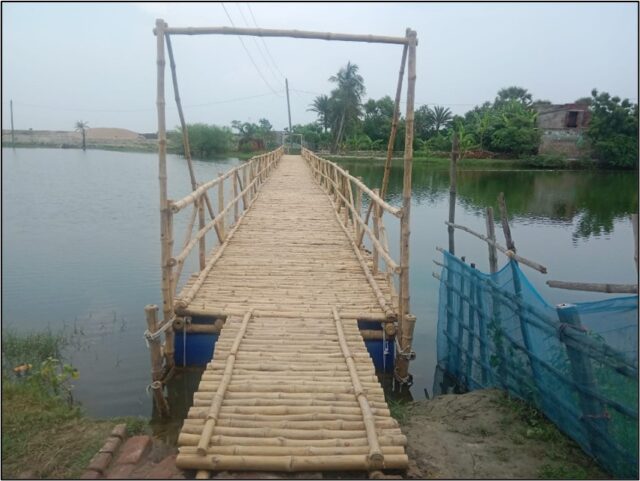 |
“This new bridge is strong and reliable,” said Afzal. “We can now move safely, without fear. Children can attend school, and pregnant women can be taken to the hospital on time.” Beyond improved mobility, the bridge stands as a testament to what communities can achieve when they are empowered to plan and lead their own development. This initiative emerged from a locally led process, where the community identified their most urgent need and responded with a practical solution using the resources available to them. The construction of the bridge reflects a concrete outcome of collective decision-making and local problem-solving an approach that not only addresses immediate challenges but also fosters ownership, resilience, and sustainability. When people are given the opportunity to shape their own futures, effective and lasting solutions naturally follow.
The bridge has already brought significant improvements to the community’s well-being. Local fish farmers can now transport their harvest to markets more easily and receive fair prices. With improved mobility, social and economic life in the village is gradually being restored.
“This bridge has given us back our dignity and access to a better future,” Afzal added. “We are truly grateful.” This story is a testament to the power of community resilience and the impact of targeted support in overcoming geographical isolation and rebuilding lives in climate-vulnerable areas.
Name: Md. Mostofa Sardar
Age: 59
Location: Dhalbaria Village (Bagherbill Landscape), Bangladesh
Md. Mostofa Sardar, a 59-year-old resident of Dhalbaria village, lives a life marked by hardship and resilience. Physically frail and unable to work due to chronic illness, he shares his modest home with his wife and daughter. His daughter lives with an intellectual disability, and his wife works in neighboring households, bringing food when she can. Often, the family survives only through the kindness of others. When nothing is available, they go without meals.
Despite these adversities, hope began to take root through a local initiative. Mostofa is a member of the Bagerbill Unnayan Songothon, a community development association formed by communities of three nearby villages. The association provides a platform for both rich and poor to discuss community issues and collectively find solutions of their landscape challenges.
During one such meeting, the members prioritized supporting the most vulnerable with sustainable income-generating opportunities. A list of potential recipients was created through community consensus, and Md. Mostofa’s name was among them.
When asked how he could best support his family, Mostofa shared a long-cherished dream of raising goats. He proposed that if he could receive two female goats, he would be able to care for them using readily available local resources, such as tree leaves and grass from nearby fields. He believed that goat-rearing could offer him a sustainable livelihood and help him overcome poverty.
Goat-rearing is a practical and profitable venture in rural areas, especially for low-income households like Mostofa’s. As the goats mature, they reproduce, allowing him to gradually expand his herd. He can generate steady income by selling goat kids, milk, and even manure, with relatively low maintenance costs. Importantly, small ruminants like goats also serve as live, movable assets during times of emergency such as cyclones or tidal surges when other forms of support are often inaccessible. In such crises, goats can be quickly sold or used to meet urgent needs, offering a crucial safety net. For someone like Mostofa, who belongs to a highly vulnerable group with limited access to government or NGO support due to a lack of accessibility, the RTF project has provided him a timely and accessible lifeline. It enabled him to begin livestock rearing despite the systemic barriers that often delay or deny support to the most at-risk populations. Over time, this small-scale livestock operation can become a reliable source of income, helping Mostofa cover daily expenses, enhance financial security, and improve his family’s overall quality of life.
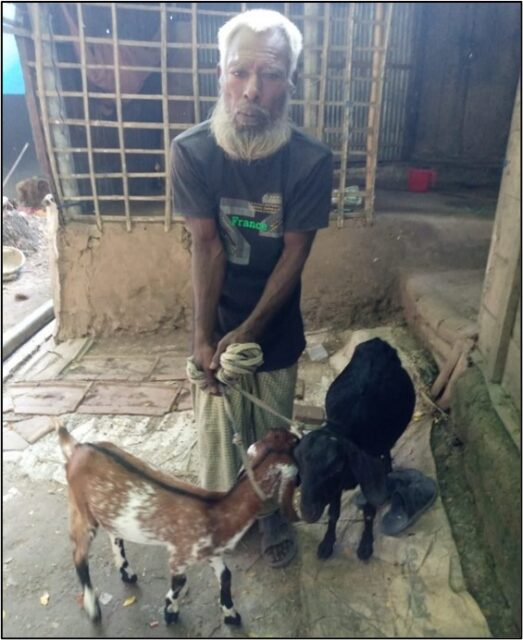
Recognizing his sincerity and the viability of his plan, the organization provided him with financial assistance to purchase two female goats. Today, Mostofa is raising the goats with care and optimism. For the first time in many years, he sees a path to self-reliance.
“I could never afford to buy goats before, though it was always my dream,” Mostofa said. “Thanks to this support, I now believe better days are ahead.”
This story is a powerful reminder of how community-led initiatives can restore dignity, inspire hope, and change lives, one dream at a time.
